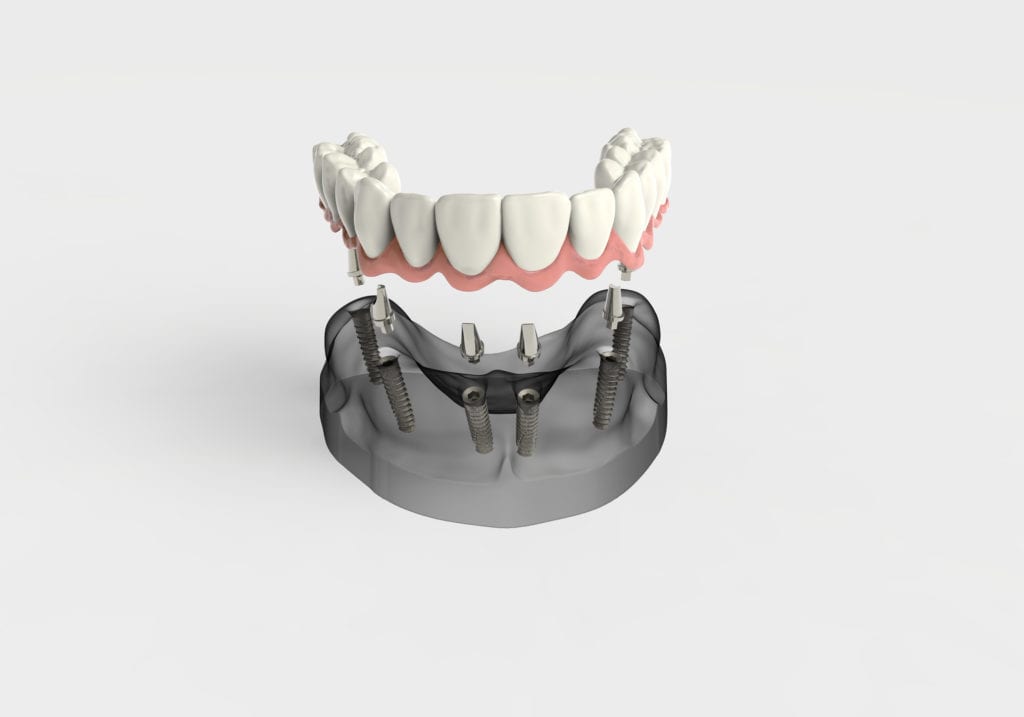If you are missing teeth, you should consider replacing them as quickly as possible. When left untreated, full or partial tooth loss can lead to many issues. It can affect a person’s self-image and increase the risk of developing nutritional problems and other systemic health disorders.
Several restorative dentistry treatments are available to replace missing teeth. Dr. Amy Marckese offers several types of dentures in Indianapolis, IN, to replace several or an entire arch of missing teeth. Dentures provide an effective solution for missing teeth, restoring beauty and function to the smile.
Dentures and partials are made from high-quality, state-of-the-art dental materials that look and function like natural teeth. DentalSpa can custom design dentures to fit comfortably and look natural, allowing you to eat, speak, and smile confidently.
Types of Dentures
Modern dentures are more natural-looking and comfortable thanks to advancements in the quality of dental materials and technology. Several types of dentures are available at DentalSpa. Your dentist in Indianapolis, IN will assess your condition, discuss your personal goals, and help you choose the type of denture that is right for you and your budget:
Partial Denture
A partial denture, also called a removable partial denture or simply “partial,” is a dental prosthesis that can replace one or more missing teeth, similar to how a dental bridge does. Essentially, this type of denture replaces missing teeth when some natural teeth are still present in the mouth.
A partial will help restore function, aesthetics, and oral health. Partials are either made with a plastic base or metal framework that supports the number of teeth missing. They are designed to stay in place with clasps and rests that form around the remaining teeth.
Full Dentures
A full denture, also called a complete denture, is a removable dental prosthesis. It can replace all the teeth in either the upper or lower jaw or both jaws. It is for patients who are missing all of their natural teeth due to decay, gum disease, or other reasons.
Full dentures are typically a plastic base that is colored to blend in with the gums. This base is designed to stay in place by forming a seal with the gums. Full dentures can restore oral function, aesthetics, and self-confidence for individuals who have lost their natural teeth.
Implant Dentures
You also have the choice to support your denture using dental implants. Dentures implants provide the best result and a higher rate of patient satisfaction. They combine the stability and security of dental implants with the convenience of dentures.
This type of dental prosthesis uses between two and eight dental implants that we surgically place into the jawbone,, where they will fuse to the bone. Then, your dentist will custom-create a denture that will attach to the implant fixtures and look natural in your mouth. Implant-supported dentures offer improved stability, function, and comfort compared to traditional removable dentures.
Benefits of Implant Supported Dentures
With today’s advances in technology, dentures can now be permanently placed. As few as four dental implants are surgically placed in the jaw bone. After a period of healing, those implants are used to anchor the denture or partial for a permanent restoration. Implant dentures have a 95% or better success rate and equally high level of patient satisfaction.

While this procedure does require a greater initial investment compared to alternatives like removable dentures or dental bridges, implant dentures offer the best long term benefits. Implants eliminate all the classic concerns that come with the removable options. Implant-supported dentures are more superior and better for your oral health for the following reasons:
- Significant improvement in retention and stability
- Restores normal chewing function, meaning no restrictions on diet
- Improves long-term bone health
- Allows patient to speak and smile naturally and comfortably
- No glues, adhesives, soaks or rinses
- No slipping or fear of teeth falling out
If you would like to learn more about dental implants, visits our other dental implant pages.
Denture Care and Maintenance
Cleaning and Disinfecting Dentures
- Brush your dentures every single day with a soft-bristled brush and non-abrasive denture cleaner to remove food particles, plaque, and other types of residue. Do not use regular toothpaste because it is too harsh and will scratch the surface of your dentures.
- After brushing, soak your dentures in a denture-cleaning solution or mild soap and water overnight. This helps disinfect and remove stubborn stains or buildup.
- Rinse your dentures thoroughly before reinserting them into your mouth, especially after soaking in a denture solution, as the chemicals can cause irritation or vomiting if swallowed.
- Schedule regular dental cleanings with Dr. Marckese to remove hardened tartar or stubborn stains that cannot be removed through regular cleaning at home.
Proper Storage and Handling
- When not in use, keep your dentures in a clean container filled with water or a denture-soaking solution. Keeping your dentures in liquid will prevent them from drying out and losing their shape.
- You need to handle your dentures with care to avoid accidental drops or damage. We suggest placing a soft towel or fill the sink with water when handling dentures.
- Never use hot or boiling water to wash or clean them. Also, never drink any liquids that is too hot. Hot liquids can warp or damage the denture material.
- Never attempt to repair dentures yourself. If you attempt to fix a broken denture, it can lead to further damage or oral health issues. Contact DentalSpa for any necessary repairs or adjustments.
Denture FAQs
Dentures have been used for centuries to replace missing teeth. If you have questions about them or the process of receiving them, please read through the frequently asked questions section about dentures.
How long do partial dentures last?
Partial dentures can have a varying lifespan, depending on your regular dental maintenance and cleaning habits. If you practice good oral hygiene and consult a dentist regularly, dentures can last for up to 15 years.
Can you add teeth to partial dentures?
As you grow older and your dental needs change, you may find that you need additional teeth added to your dentures. For most partial denture implants, you have the ability to add additional teeth if needed; however, it is important to consult with your dentist to determine your specific needs.
Do you need adhesive for dentures?
Dental adhesive is not always necessary, but it can improve the fit of your dentures. If your dentures are well-fitting, you will usually not need any help keeping them in, but some people still choose to use adhesive for a sense of security.
Can I wear dentures if I have a severe gag reflex?
It may be hard to wear dentures if you suffer from a strong gag reflex. Some people with extreme gag reflexes find them very comfortable. However, we can work with you to design a denture that minimizes this sensation. Customization and adjustment of the denture’s shape and fit can help reduce gagging.
Can you eat with partial dentures?
You will still be able to eat and drink the same foods as before getting your partial dentures, and there is no need to adjust your normal diet. However, if you eat sticky foods, cleaning your dentures may be difficult, and hard foods may damage your dentures over time.
How long do partial dentures take to settle?
It will take several days for the gums to adapt to the different pressures the new dentures place on them. After 2 to 3 days, the dentures will start to feel as though they are “settling in,” and the retention and stability will increase.
Is it hard to talk with partial dentures?
The breaking-in period for partial dentures is typically very short. It will likely only take a few days of good practice to overcome any challenges you have and speak clearly.
To learn more about getting dentures to replace your missing teeth, contact Dr. Amy Marckese with DentalSpa today. You can reach our Indianapolis dentist office by calling 866-486-0230. We also offer an online form that you can fill out to schedule an appointment.
